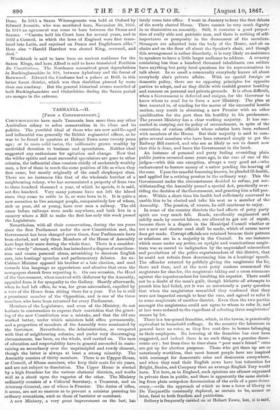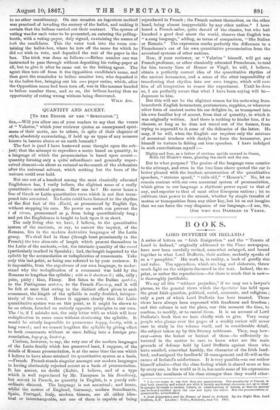TASMAN
[FROM A CORRESPONDENT.] CIRCUMSTANCES have made Tasmania lean more than any other Australian colony to sober conservatism in its ideas and its politics. The youthful ideal of those who are now middle-aged and influential was generally the British regimental officer, as he was to be found in quarters at Hobart Town some twenty years ago ; or to more solid tastes, the millionaire grown wealthy by undivided devotion to business and speculation. Neither ideal suggested any enthusiasm for agitation and change. Now that the wilder spirits and most successful speculators are gone to other colonies, the influential class consists chiefly of moderately wealthy men, a few of them in much the same position of life as when they first came, but mostly originally of the small shopkeeper class.
There are uo instances like that of the wholesale butcher of a neighbouring colony, who has accumulated a property of from two to three hundred thousand a year, of which he spends, it is said, not five hundred. Very many persons have not left the island since they came to settle in it, or were born in it. It is quite a new sensation to live amongst people, comparatively few of whom, rich or poor, old or young, have ever seen a railway. The old came before railways were made anywhere, and both live in a country where a Bill to make the first has only this week passed the Legislature.
Nevertheless, with all their conservatism, during the ten years since the first Parliament under the new Constitution met, the Government has been changed seven times, four Parliaments have been elected, and only three Members of the House 'of Assembly have kept their seats during the whole time. There is a consider- able " rowdy " element, which has introduced a degree of scurrilous- ness and coarse personal abuse, astonishing to decorous English ears, into hustings' speeches and parliamentary debates. An ex- Cabinet Minister opposed his brother at a late election, and used towards him language so opprobrious and abusive that even the newspapers shrank from reporting it. Ou one occasion, the Head of the Government, when received with disfavour by the Assembly, appealed from it for sympathy to the Gallery. Shortly afterwards, when he had left office, he was, for gross misconduct, expelled by a vote of the House from sitting there for a year. Yet he is still a prominent member of the Opposition, and is one of the three members who have been returned for every Parliament.
Members of the Legislature, and even of the Ministry, do not
hesitate in conversation to express their conviction that the grant- ing of the new Constitution was a mistake, and that the old one worked better, under which ministers held office permanently, and a proportion of members of the Assembly were nominated by the Governor. Nevertheless, the Administration, as compared with that of neighbouring colonies, and under very discouraging circumstances, has been, on the whole, well carried on. The men of education and respectability have in general succeeded in main- taining an ascendancy over the unprincipled and rowdy element, though the latter is always at least a strong minority. The Assembly consists of thirty members. There is an Uppper House, or Council, of fifteen members, who keep their seats for six years, and are not subject to dissolution. The Upper House is elected by a high franchise for the various electoral districts, and works well as a check upon the vagaries of the other. The Ministry ordinarily consists of a Colonial Secretary, a Treasurer, and an Attorney-General, one of whom is Premier. The duties of office, it seems, are not so onerous as to prevent a minister pursuing his ordinary avocations, such as those of barrister or merchant.
A new Ministry, a very great improvement on the last, has
lately come into office. I went in January to hear the first debate of the newly elected House. There cannot be very much dignity in so diminutive an assembly. Still, it contains a good propor- tion of really able and patriotic men, and there is nothing of self- importance or pomposity in the demeanour of the members. Strangers are admitted into the body of the House, and sit on chairs and on the floor all about the Speaker's chair, and though this arrangement is rather disorderly, it is very likely an assistance to speakers to have a little larger audience to address. A country containing less than a hundred thousand inhabitants can seldom have anything but petty local questions for its representatives to talk about. In so small a community everybody knows all about everybody else's private affairs. With no special foreign or domestic policy, there are no opposing principles for opposite parties to adopt, and so they divide with tenfold greater hostility and rancour on personal and private grounds. It is often difficult, when a Government is defeated and resigns, for the Governor to know whom to send for to form a new Ministry. The plan at first resorted to, of sending for the mover of the successful hostile motion, may result in obtaining a new Premier with no other qualification for the post than his hostility to his predecessor. The present Ministry has a clear working majority. It has suc- ceeded in carrying out its policy of retrenchment, in spite of the connection of various officials whose salaries have been reduced with members of the House. But their majority is said to com- prise several members who have been returned simply to get the Railway Bill carried, and who are as likely as not to desert now that this is done, and leave the Government in the lurch.
An instance of personal and party feeling overriding plain public justice occurred some years ago, in the case of one of the judges—with this one exception, always a very good set —who endeavoured to borrow money of a suitor pending the hearing of the case. Upon the scandal becoming known, he pleaded ill-health, and applied for a retiring pension in the ordinary way. This the Government under the circumstances decided to refuse, yet not- withstanding the Assembly passed a special Act, practically over- riding the decision of the Government, and granting him a full pen- sion. Within a short time his health had sufficiently recovered to enable him to be elected and take his seat as a member of the Assembly. The pension, of course, he still continues to enjoy.
In some of the country districts the bad effects of petty party spirit are very much felt. Roads, excellently engineered and solidly made by convict labour, are allowed to get out of repair, because there is a dispute in the Municipal Council whether or not a new and shorter road shall be made, which of course never does get made. Corrupt officials are retained because their patrons or relations are in a majority in the Council. In one instance which came under my ;intim, an upright and conscientious magis- trate was so moved to indignation by the unpunished misconduct and peculation of the police superintendent of the district, that he could not refrain front denouncing him in a .hustings' speech. The offender retorted by publicly giiing the magistrate the lie, there and then, and at the next petty sessions summoned the magistrate for slander, the magistrate taking out a cross summons against the superintendent for insulting his superior. There could not be a doubt of the man's guilt, though hitherto all attempts to punish him had failed, yet it was so notoriously a party question that when the magistrates assembled they confessed that they were not impartial enough to hear the case, and agreed to refer it to some magistrate of another district. Even then the two parties amongst the magistrates could not agree to whom to refer it, and at last were reduced to the expedient of selecting three magistrates' names by lot.
There is a ten-pound franchise, which, in the towns, is practically equivalent to household suffrage. In the country the labourers in general have no votes, as they live rent-free in houses belonging to their employers. No lowering of the franchise has ever been suggested, and indeed there is no such thing as a genuine demo- cratic cry ; but from time to time sham " poor man's friend " cries are got up for election purposes. Those who get them up are so notoriously worthless, that most honest people here are inspired with contempt for democratic cries and democrats everywhere, and when they read their English news have less toleration for Bright, Beaks, and Company than an average English Tory would have. Yet here, as in England, such opinions are oftener expressed in private than in public, and there is apparently the same shrink- ing from plain outspoken denunciation of the evils of a pure demo- cracy,—evils the approach of which so true a lover of liberty as De Tocqueville constantly deplored, as certain to be, sooner or later, fatal to both freedom and patriotism.
s Bribery is frequently carried on at Hobart Town, but, it is said, in no other constituency. On one occasion an ingenious method was practised of invading the secrecy of the ballot, and making it certain that the bribees carried out their contract. The system of voting was for each voter to be presented, on entering the polling- booth, with a voting-paper, duly signed, containing the names of both the candidates. This the voter took into the room con- taining the ballot-box, where he tore off the name for which he did not wish to vote, and deposited the rest of the paper in the box. The trick was done as follows :—Bribee number one was instructed to pass through without depositing his voting-paper at all, but to give it after he came out to the bribing agent. The agent then tore off from it the Opposition candidate's name, and then gave the remainder to bribes number two, who deposited it in the ballot-box, bringing out his own paper entire, which, after the Opposition name had been torn off, was in like manner handed to bribes number three, and so on, the bribees having thus no opportunity of voting wrong without being discovered.
WILD Ass.































 Previous page
Previous page